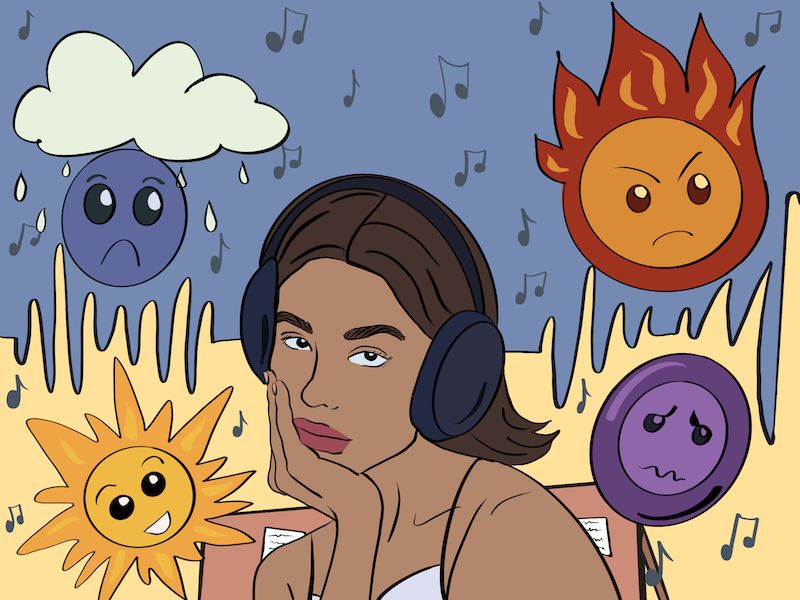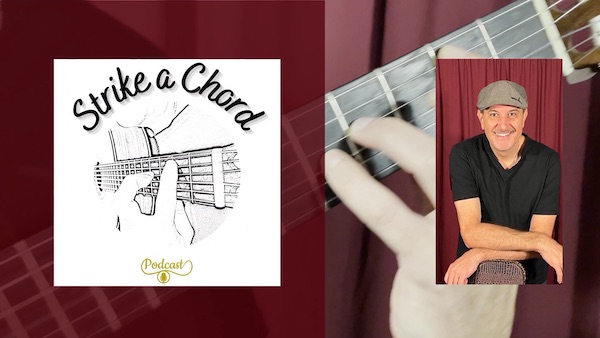At a young age, music stirred emotions within me that were initially confusing, leading to…
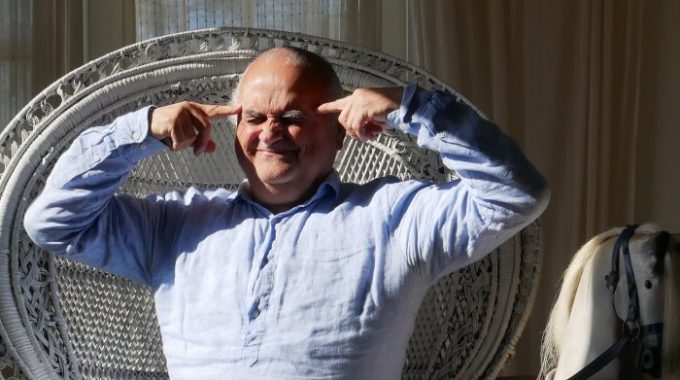
Music Listening in Three Dimensions
Hugh Fraser Upright Bass
Hi everybody.
Welcome, this is Hugh Fraser, a beautiful upright bass player, both in person, as a musician and on the outside also. We’re all beautiful people.
Today we get together, we’re going to play a bit. We’ve got some upcoming concerts at my Sydney Guitar School with bass and guitar and what we actually found as a center point of our conversations was a very interesting topic about music, what it means to be able to project our feelings to others and what we have to do in comparison to what we might see on social media to achieve such.
So we started talking about music mindfulness the other day, it was actually a concept, the definition of such you introduced me to, that I was actually thinking about as when I ‘m playing music, I always try to be in the moment conscious of the feeling of what I’m hearing and the musicians around me. You summarized this as music mindfulness. So I have a cheat sheet with questions that I want to ask you.
What is Music Mindfulness for you?
Well, I guess it was a term I kind of appropriated, useful to describe the state that we find ourselves in as players and as listeners, to describe the roles players and listeners perform, because music requires listening.
For me the best music is music where I can hear players listening to each other and that is a kind of an in-the moment mindful state.
I think as defined by a modern sort of mindfulness movements which derive from meditation, it is a kind of a musical meditation. Meditation is not defined in my mind as the absence of something but rather as a way of opening your thinking to kind of everything in a way.
It’s just about being open to being in the moment, to either like or not like what you’re hearing.
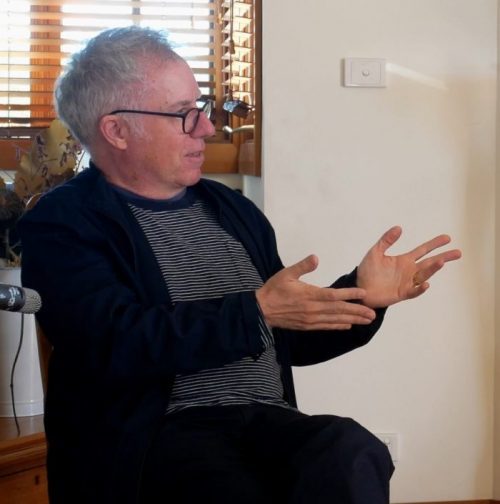
Music Sharing
In a sense this means you are with other people. We are not alone, we are in the moment and we’re actually sharing with the audience, with others.
So it’s not it’s not about us anymore, it’s not about you or me as individuals, it’s about what it feels like as you’re there, I’m here, we’re playing together for this, there’s an entity there and I’m playing and we’re feeding that entity, you’re feeding into it, we’re listening to each other, we’re seeing the result and we’re adapting. The audience is also feeding into that sphere and then listening to it.
In a way it could be like a communion, like what religions say. Meditation focuses also on love, friendship and sharing. Imagine that in your life you were to take away the sharing and it’s just about you, it doesn’t feel good.
I don’t feel good playing the guitar without considering that I’m going to share something. It’s an excruciating concept, it hurts.
Idols or Communion
With no disrespect to pop music as we love stars, we love icons of music being up there, being sort of like godheads of our popular culture or whatever.
That’s one thing which is great but people I think enjoy music (maybe it’s a smaller group of people), of that deeper, you use the word communion, I think it’s a nice word.
But there are lots of communities with mega churches, but 50 000 people in a stadium taking some sort of communion can’t be as personal as 10 people in a room doing the same thing.
No, but it serves a purpose and I ‘m not going to say that purpose isn’t valid. I don’t go to stadium concerts anymore, well I went to see Paul McCartney with 20 000 other people, but that’s because he is a living icon of a cultural icon and if he didn’t do all the old hits, we’d feel that our shared nostalgia, the bubble would be burst.
In a way it could be like a communion, like what religions say. Meditation focuses also on love, friendship and sharing. Imagine that in your life you were to take away the sharing and it’s just about you, it doesn’t feel good.
I don’t feel good playing the guitar without considering that I’m going to share something. It’s an excruciating concept, it hurts.
Music Intimacy
But there’s that other thing about more intimate music, and traditionally let’s say mindfulness or meditation is considered a sort of a solitary pursuit. It’s a solitary piece where you’re tapping into an esoteric oneness, and we can do that with music.
I’m always full of admiration for people who walk into an audience space, where their kind of expectation is for the smaller community, the more intimate community. It’s a beautiful thing to be able to listen to.
We’ve also got the fame, the artist, that’s great ,the showmanship. It’s an important balance to all of that.
Sharing the Music Listening
I would add the word sharing, they’re sharing the music listening. They’re sharing the awareness. We’ve been playing for a long time, over 40 – 50 years , each of us, so we’ve got 100 years of experience here.
We are into music for the long term as it’s a way of living.
Can we Live Life Without Mindfulness as a Musician?
Can we move forward focusing on the artist as a symbol, as the idol?
Can my music move forward in that direction and feel good about it as a musician?
For example showmanship. We were talking about the other day like I’m great, I can play very quickly, I can do a lot of things so in a way that it is an accomplishment. It’s a difficult accomplishment. But can we move forward on that basis?
As a musician and guitar teacher I cannot. When I started playing I was very fancy and I can’t do that anymore, actually I can but it doesn’t feel good. So to actually feel like I’m just creating the wow can feel good for about one show but afterwards it doesn’t.
So I say to myself that after I’ve toured and been with musicians, artists who actually created that artistic idol figure and then suddenly disappear, fall into anxiety, into depression, into chaos, into drinking, what’s going on?
I think that to stay up there, all we have to do is continue the same thing that made us start music which is actually the I’ve got a story, I’ve got something to share, it’s not my own personal feeling, it’s about what’s there in the middle between all of us and maybe that would be the way the only way to continue so my question is:
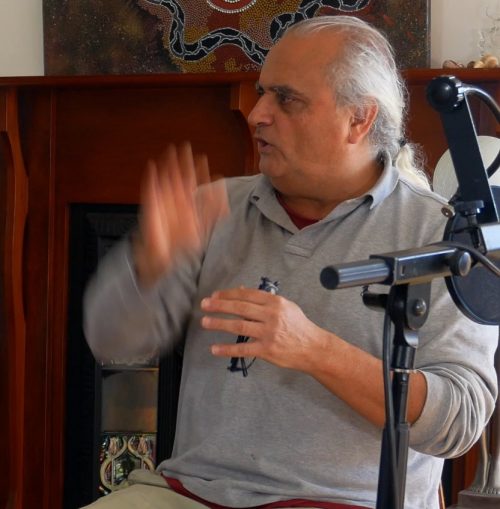
Can we Develop Music for a Long-Term Career Without that Music Mindfulness
I say no why. For example, I ‘ve got good musical friends that end up with problems with their hands, and they complain.
This is because of playing the guitar in a way, or the instrument and not being aware of the damage you’re doing to yourself. They are playing without limits to joy. You have to stop playing when you cannot share your feelings anymore or flow.
Possible Depression Anxiety
As a consequence I’ve got friends who can’t play anymore, concert players that can’t play anymore.They all say, I don’t feel good.
Something is missing as along the way something stopped: the enjoyment. You can’t enjoy music unless you’re sharing it and you get feedback. So can my question to you: Can we pursue a career in music long term without that mindfulness?
Mindfulness Versus Virtuosity
Personally I would find it difficult. I was like you say, more virtuosic, capable of feats, of musical daring, when I was younger and a more athletic musician. I can relate to what you’re referring to as musical athleticism.
And when we’re younger that appeals to us more, but not excluding the obvious observations that some of the great musicians that we enjoy like Chick Corea right up to the moment where he unfortunately had to stop because he wasn’t he wasn’t alive anymore, seemed to be capable of unlimited technical potential.
There was still something about Chick as I grew older. It wasn’t those moments of athletic daring that appealed to me but those deeper moments where he revealed his true deep state as a listener and a musician of rich substance. That’s the same with Herbie Hancock or Miles Davis.
We acknowledge them as true greats of our industry and for whatever set of circumstances, they’ve created that individual being, that they are of true greatness.
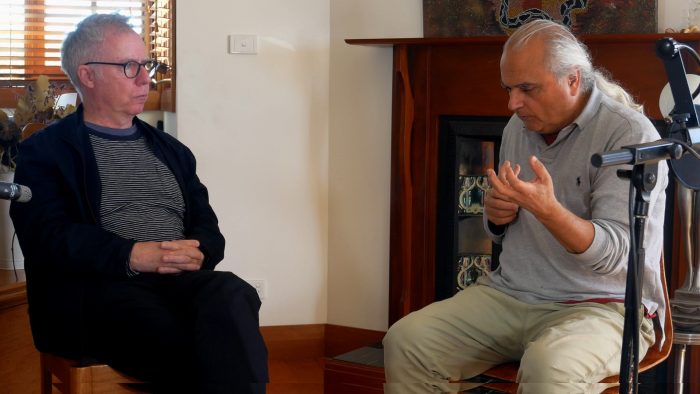
Music Honesty, Integrity and Humility
Music doesn’t just exist at that higher level. Like art isn’t just about going to a gallery and looking at Picasso, if you’re a modernist, or Renoir if you want a traditionalist or Monet if you want impressionism.
It’s about all those other artists as well and there are millions. The fact is that we can go into a small community in a foreign country and we can hear music that has honesty and integrity. The greats of our music have a great way of reminding us that they’re also honest, with integrity and truly unbelievably exceptional. But then music is a way of communicating honesty, integrity and beauty or ugliness or anything. I like John Cage’s words where he said he doesn’t want music to tell him what to think. He sort of talked about being in the moment and hearing.
Virtuosic Music Listening is Being in the Moment
So you talk about it with your sound but I think that’s also the power of instrumental music as it doesn’t give you sort of a four lines of a poetic kind of composition, that just tells you what to think.
I didn’t really have all that much interest in being the kind of virtuoso because that kind of music leaves me a little bit cold. Unless they’re really great guys, an average person trying to be virtuosic, I just don’t know what they’re doing.
We’re very experienced listeners as well as players so we know what we’re hearing and we go yeah but that’s not really that interesting whereas when you hear somebody like a Bill Frisel or Charlie Hayden, all those guys that are really sparse and open, you hear this incredible listening when you listen to them. I mean superficially you hear this wonderful aesthetic thing within their music you hear the incredible depth of their listening.
Their listening is elevated to the same pinnacle of art as that of a great technical virtuoso.
So virtuosic listening is being in the moment.
Three Dimension in Music Mindfulness
It’s spatial, you can hear it, the music expands in all directions while other types of music are just in one direction of the one person. Some people play like this and some people play in the zone and space.
I remember going to a funk concert, Maceo Parker, a few years ago. They took about an hour to warm up on stage. After an hour I could start feeling the vibes of what they were doing. They were synced with the space and with the audience, and then Parker came on stage and started the 3 hour concert.
He was ready to groove and you’re saying, wow it has taken an hour. It takes an hour even for James Brown to warm up to connect to the groove.
It Takes Time to Connect to all
I went to see him when he just got out of jail. It was a big stadium, before he came on stage the band started and it took them a long time until they got it into the groove.
He then came on stage, so it’s sort of like, well he helped also, but it’s sort of like that being in the moment, that listening to each other, that creating that energy or feeling the whole space.
It takes time, so showmanship is not going to help to achieve this in the moment. Once you have connected then you can start the showmanship but initially you can’t. You have to groove to get to that moment.
One Hour until I Started Feeling the Trance
I’ve seen African bands where you have 50 people there on stage and you start off the concert saying boring, half an hour later boring, but 45 minutes later you start getting into the trance, the groove, the people, the dancing, you start the music listening with clarity and the whole stadium becomes just one.
This is music mindfulness and then after we have all connected you’ve got the guitarist and the drummers doing impressive solos on top of that, but that initial state of connecting, you can’t get that through showmanship.
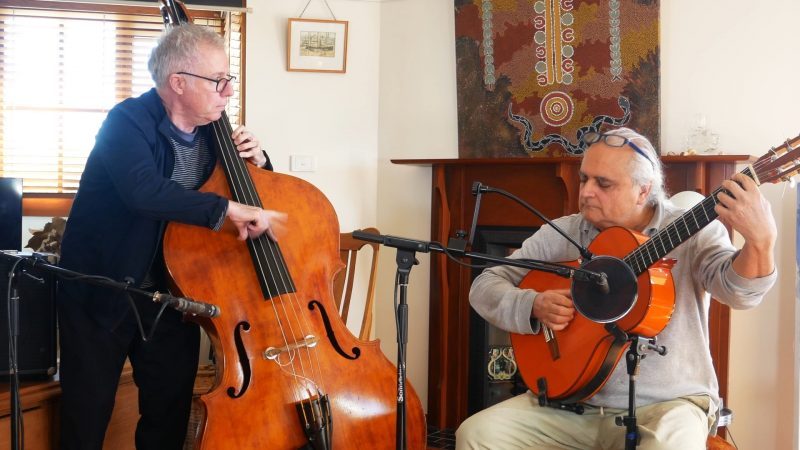
Bring Music to Life
It’s interesting because you’ve just sort of talked about scenarios where things take time before the light bulb goes on.There’s what we’re looking for and what I personally really enjoy.
I think most of the people I work with are really great musicians that wish to bring that composition to life. When you rehearse, you know you’re reading dots but in the performance you can then make that piece a living breathing piece of music.
You’re not just reading off a page and orchestras do that you know. But generally they do it with a very familiar repertoire. I have a huge respect for my colleagues playing in orchestras because they can go out and make that Beethoven 5 a New Beethoven 5.
We also had a culture back in the day where you could happily listen to 40 minutes of a symphony or an hour.
Improvising and the Music Listening Experience
What I enjoy as modern improvisers is getting together with a group of people and you can tell from the moment you play your first note that you’ve got a music listening thing going on, that everybody is kind of on the same page.
It doesn’t have to be on the same page as all the players or it has to be on the same page as listeners to turn the switch on right from the get-go, yeah and that’s what we do as professionals.
That’s what I feel I’m best at my age as a musician and bass player.
No Good Music Without Music Listening
I would even add if we don’t listen to each other, if we’re not playing and not listening there is very little chance of any good music happening as improvisers and the audience will get totally bored.
You have to give it time, you have to get respect, you have to give a lot of space and just let it flow. You can’t force it, it has to flow and then you’ll get the attention of the audience.
Because you are giving everybody time to actually get into that moment.
How many greats are there from King Oliver, Louis Armstrong, from Lester Young to Duke Ellington, from Miles to Bird and then to our modernists. So many guys I love listening to: Larry Grenadier as a bass player, you mentioned Bill Frisell. I mean all these guys, I´m not talking only about the level of their playing but especially how they’re listening to music and the level of their dialogue.
How do People Perceive Music now
That’s what I’m worried about, social media, and the internet where it’s sort of like, oh look what I can do in 10 seconds and generally unfortunately it’s only showmanship. I might be mistaken because I might be looking only at that showmanship, I might be actually a sinner of looking at that.
So the perception of music is that of a 30 second, or one minute performance of high energy. This doesn’t work when you play live, you can’t do this and achieve satisfaction.
Therefore, if our perception of what music is, is a consequence of this mass media that is heading towards a metaverse, that welcomes the 10 second or 15 second performance and conclusion.
As educators and performers, is there room for our music mindfulness and connection?
Slow Things
Not all art occupies the same space. For example there’s slow cooking and it’s not as big as going to Mc Donald’s which is still the sort of go-to default fast food kind of option for a lot of people.
But there’s also a select group of people that choose a slow food option.
There are youtube videos of people who just unpack presents, unpacking a gift wrap package, wrapping a package or doing these kinds of slow things that people will watch for five minutes and on youtube they’re of quite high rating.
It’s not somebody that says, oh here’s my latest handbag and I’m unpacking or, oh look at this quality thing. They’re actually just doing simple little things. There’s also the old simple thing of screensavers which were just a fire burning.
More Slow Things
We all have these little moments in life where we stop for at least five seconds. I have a mindfulness reminder on my watch that says take one minute to just breathe.
We know all of this from a wellness industry ( in some countries) that tries to make money out of it. So we all know about this and we’re not idiots.
Music as a Slow Thing
Music doesn’t have to be an objective activity, it can just be for the total subjectivity of having a sound experience. So listen to music, close your eyes, and you will never want to listen to any other thing that is not as important because you’re in that moment with the audience and listening.
Then you will have learnt that there is something that will do that when you need that thing. It’s a nourishment for the ears, the body and the brain, the blood flow of existence as a musician.
I can only do, play and listen to that. It’s the way I was programmed as a child with music.
If I don’t do that, follow that with music, if I don’t listen to that, if I don’t have a lifestyle in that way, I just fall sick.
Sharing the Moment is the Thing
That’s what we wish to share, that’s what we truly feel. That’s what gives us the most and it’s just like saying, look maybe you might like it a bit too so share this moment with us.
Live music, improvised music such as jazz or latin music or flamenco will always have a place because people need those places to go to and experience soul nourishment.
I can only do, play and listen to that. It’s the way I was programmed as a child with music.
If I don’t do that, follow that with music, if I don’t listen to that, if I don’t have a lifestyle in that way, I just fall sick.
The Value of Other Arts
I think there’s also great value in other arts. I saw a recent Andy Warhol documentary on netflix about the Andy Warhol diaries that documented art pop parties for the masses. But there’s also a kind of art that just needs one person in a room or even an art that is just about the artist doing something for themselves without any expectation.
Van Gough tried to make some money out of his art but his art wasn’t very much acknowledged or viewed by anyone other than him and his people close around him until after his death.
These moments are the pinnacle of aesthetic beauty.
The Only art Form is Music
I find that the only art form that is a true art form is music. When you’re painting it’s just basically a two-dimensional representation but with music we’re creating the painting with other people at the same time as improvisers.
Music in the 4th Dimension
With music we’re dealing in three dimensions including time and space. Cage and Stockhouse, and people like that, were talking about moving music in a fourth dimension.
Taking it from a written page interpreted by an orchestra to bringing this thing in your room. A different experience of being in this moment of time.
I come from a family of artists, and I know there are certain arguments expanding the definition of art to a kind of living art which involves music and sound.
Talking About Music Helps the Audience Perceive it in a Different Manner
We’’re talking about music on a video that gets shot out over the airwaves. The act of us talking about music can be the important part of a process of getting people to listen to our sounds with a different mindset.
I know that from the way artists talk about art, this can be a very useful and important thing. Frank Zappa said talking about music is like dancing about architecture but I find some buildings funky. Cool let’s have a play.
Comments After Playing the Song
There’s lots of music out there that is so perfected but it really is about that conversational thing isn’t it? It’s just about having a good chin wag you know, good fun music.
The Musical conversation
The tune is just like choosing a subject, like drifting into a topic of conversation and it’s got nothing to do with words. So we just get in there, hear all these sounds, all the chords, all these melodies going on and I have no idea what comes next even though the song is constantly repeating structure.
That’s interesting because structure is one of those things I often use when we’re talking about free music. I was watching this wonderful thing with Cecil Taylor, a masterclass with Cecil Taylor years ago and basically everybody was sort of playing and then he said:
Okay tell me what you’re all doing, they replied, he responded I don’t want to see a bunch of musicians up on stage just not thinking you know and then when he sat down and played, it was so not anchored to a structure, but it obviously had structure.
Free playing is taking you in time and space to play from planet a to planet b and you need great knowledge to be able to do it.
Structure and Musical Freedom
So structure enables us to do such. I’m saying that without structure, we can’t improvise, we can’t be free. We need a vehicle of some sort to be able to start being free. You can’t just go and play whatever. We played this song eight to 10 times through yeah, and we still had a half an hour of conversation left. So structure allows this free form of creating on the go.
This concept is thoroughly explained in all my online guitar cousres
